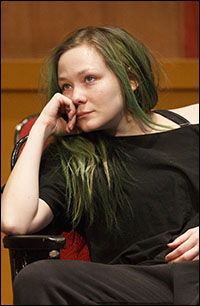
The new adaptation is by acclaimed British playwright and screenwriter Heidi Thomas. A developmental reading will take place later this month in New York City.
A new adaptation is probably in order. While the score of Gigi is regarded as a delight — including such songs at "Thank Heaven for Little Girls" and "I Remember It Well" — the show's long been a tough proposition in modern times due to its antiquated treatment of male-female relations. The story, which tells of a bored French playboy who accidentally falls in love with a young woman who's brought up to be a courtesan, is not as straightforwardly charming and airy as it may have been more than half a century ago.
Segal seems to understand that the female audience (which, on Broadway, traditionally chooses which shows to go to) may not be in love with Gigi's male-dictated situation or fate. "Heidi Thomas has restored Gigi to her rightful place at the center of the story," said Segal in a statement, "backed by a funny, warm family of women that show the men in the world around them the finer meaning of life and love. This is 'chick lit' musical theatre!"
Like the current Breakfast at Tiffany's, Gigi is a property closely associated with Audrey Hepburn — who starred in the original Broadway production of a play version of the tale (in an adaptation by Anita Loos). (Leslie Caron starred in the film.) So, casting will be a challenge.
*** Some Catholics have a wonderful way of making the theatre feel topical and controversial in a way it hasn't really been in decades. Catholics were there to decry Jesus Christ Superstar when it came out. The picketed Terrence McNally's Corpus Christi for its modern telling of Jesus' story. And here they are again to protest the Broadway world premiere of Colm Tóibín's The Testament of Mary, which depicts the mother of Jesus as a solitary skeptic in the days following her son's crucifixion
The play met with protests March 26, its first night of previews at the Walter Kerr Theatre. The American Society for the Defense of Tradition, Family and Property, a non-profit Catholic organization based in Spring Grove, PA, blasted the new play with banners reading, "We offer God this public act of reparation and vehemently protest against the blasphemous play The Testament of Mary" and "Blasphemers believe free speech is absolute. But there is no such thing as a right to lie... to defame... to offend God!"
A group of nearly 50 protesters, among them several children, stood across from the Walter Kerr Theatre on 48th Street, reciting the rosary and saying the Lord's Prayer. The group dispersed shortly following the start of the 8 PM performance.
The producers offered the following statement to Playbill.com regarding the protest: "The Testament of Mary explores, in a very serious way, something that matters deeply to all of us. It is neither anti-Mary nor anti-Christianity, but rather a portrait of a very human woman — a mother — who is trying to make sense of and come to terms with the tragic death of her son. We respect the right of protesters to express their viewpoint and ask that they come to our play with an open mind and let the work speak for itself."
 |
||
| Louisa Krause in The Flick. |
||
| Photo by Joan Marcus |
Annie Baker's play The Flick earned critical acclaim when it opened earlier this month. But not everyone in the audience has loved it. Many subscribers have deserted the production at intermission. The play, which takes place in a decrepit movie theatre, runs over three hours, contains many silences, and features numerous scenes of the cinema's employees methodically sweeping and mopping the auditorium.
This week, Playwrights Horizons artistic director Tim Sanford took the unusual step of emailing subscribers about their criticisms of the show.
"I have to admit I was not totally prepared for it to be such a polarizing show," wrote Sanford in the letter, which has been published in news reports. "I love Annie's work and thought this was just the play to introduce her to a wider audience. Here are three characters rarely portrayed on the stage these days and Annie imbues them with such humanity and integrity….
"I hoped that Annie's palpable...compassion [for] her characters and the play's fairly straightforward plot about a developing ethical workplace quandary along with would win you all over. Of course I had some trepidation about its length. Theatregoers rarely encounter three-hour plays these days even though most classic scripts from earlier ages routinely clock in well above that length. When performances began and some of you walked out at intermission, emphatically expressing your displeasure to our House Manager, we had lengthy discussions about what to do…. "But after our initial concern about walkouts, we began to pay attention to the other voices, the voices that urged Annie and Sam not to cut a second, the voices imbued with rapture for a theatre experience unlike any they had experienced and for a production that stayed with them for days even weeks afterwards. And it became clear to me that every moment of the play and production was steeped in purpose. Annie had a vision and this production beautifully executes that vision. And at the end of the day, we are a writer's theatre and my first responsibility is to that writer. My goal is not to dissuade any of you who disliked the play. I would rather evince passionate dislike than a dispassionate shrug."
***
Has the New York International Fringe Festival begun early this year?
I ask only because the new Off-Broadway premiere Cuff Me: The Fifty Shades of Grey Musical Parody, which began March 27 at the Actors Temple Theater, sure sounds like a Fringe title to me.
Cuff Me is written by Bradford McMurran, Jeremiah Albers and Sean Michael Devereux of the improv group The Pushers. It was conceived by Tim Flaherty, who is also a contributing author, and Sonya Carter, who directs. Obviously, the work is based on the S & M-themed national best seller whose popularity has become the subject of national wonder and puzzlement over the last year or so.
Will the people who love the book care to see their guilty pleasure sent up? Will the people who deplore it bother seeing a stage version of it? This is the kind of show that could either disappear in an instant or run forever. Time will tell.
***
 |
||
| Tom Stoppard |
||
| photo by Joseph Marzullo/WENN |
Airing Aug. 26 on BBC Radio 2, the audio drama, which incorporates music from the album, will feature actors Iwan Rheon and Amaka Okafor in the two leading roles, as well as Bill Nighy, Rufus Sewell and Adrian Scarborough.
The project is not exactly a new idea. The BBC reports that Stoppard had initially been approached to author a play based on the album in the early 1970s. Guess they kept after the writer until he was free.
***
Finally, Richard Griffiths, the British character actor whose career bloomed late in life with numerous successes on the London and Broadway stage, died March 28 of complications following heart surgery at University Hospital in Coventry, central England. He was 65.
Griffiths, who only became a major stage star in the last decade of his life, possessed a frame was as big as his gifts as an actor. He was a striking presence on stage, his naturally fulsome, playful personality radiating through his physicality to dominate any scene he was in. He won every award in the book for his unforgettable performance as a charismatic and controversial teacher in Alan Bennett's The History Boys. His approach to acting assignments was often counter-intuitive, yet insightful. The key to playing boisterous Falstaff, he said, was, "Don't do jokes. Falstaff is actually a very well educated, scaly opportunist who's out for number one. That's what you must play first. He's an absolute bastard." In person, the actor was very much like the character he played — witty, charmingly subversive, digressive in conversation and fully aware of (if slightly annoyed by) the rich panoply of life.










